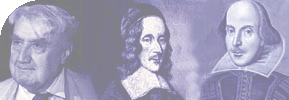The First Folio presents The Merry Wives of Windsor as Shakespeare would have designed it in the summer of 1596 : with one of the company’s ‘leading ladies’ assigned to the longest woman’s part (Mistress Page), and the other by means of I Henry IV firmly attached to Mistress Quickly, only a boy of sixteen would have been available to star as Mistress Ford. With Falstaff designed for a senior actor of James Burbage’s calibre, Master Ford would be played by Richard Burbage (29), already an exceptional actor. And the one every true boy player wants to be on stage with as his female lead.
With Sir John Falstaff comes his servant Robin. Which means stage experience to a boy who is not yet ready for a woman’s part. And for a boy of eleven at best, it is a great honour to have a scene with the company’s old master.
Being a page boy, this kid may very well have doubled as the Page boy, who, judged by his learning, is not a day older than little Robin. And William Page is on stage with Hugh Evans, master of the schoolboys who perform a masque in the final scene. And the man who composed their text, a short poem.
So far for theory : by the time the play was rushed into production, two of these actors had died. And had probably been dead before Shakespeare started writing. The best theory for him to write it being the occasion of the Garter Feast at Windsor Castle on 23 April 1597. This on request of the company’s patron, Lord Hunsdon, as his contribution to the festivities in which he was to be installed as a Knight of the Garter.
If the Lord Chamberlain wanted his theatre company present on this important day, he must also have requested his other charge to perform : The Children of the Chapel Royal. And surely enough, the 1623 Folio edition has these boy choristers on stage in the two final scenes. Where they sing under direction of Master Evans ; a Welshman who was in charge of the Children’s theatre productions. From 1598 or 99 onward he had Burbage’s Blackfriars Theatre for a base, and his best performers grew up to become actors in Burbage’s company. Which suggests the use of one of the Lord Chamberlain’s theatre companies as a training facility for the other.
Under Master Evans the Blackfriars was in legal respect a grammar school. But not really in the same league as the one in Stratford, if a certain playwright’s portrait of its headmaster is anything to go by : the real Evans was by learned profession a scribe. And the scene (4 ; 1) in which his incompetence is exposed, is quite accurate on this school’s details ; Evans wears the clergyman’s black, when testing the Page boy on his ability to memorize rather unintelligible wordsequences. And then allows him to join his classmates at missing out on school “to play”.
The 1623 Folio edition therefore pictures a situation that, based on the available facts, cannot be dated before 1599. The 1602 Quarto, however, is far less specific : it does feature The Children of the Chapel, but lacks both scenes in which Parson Evans is in charge of the boys on stage. Which leaves only a few minor clues to enable his identification as their schoolmaster. Or as the author of their song. A performance by the real Evans would have made amends for that, but that seems an unlikely scenario. And the author’s haste to meet the deadline offers the simpler explanation.
The Merry Wives of Windsor reportedly shows traces of time pressure, but somehow Literature Studies has failed to connect a play that is supposed to have been commissioned at very short notice, to a Quarto edition that not just deviates on text, but lacks the entire final act, except for a skeleton version of the play’s indisposable final scene. It also lacks the little page boy. But at least it has proper stage directions. At which point the superior Folio version refers its professional users back to the Quarto, because no director should take its improvements seriously when it comes to entrances.
From which observations follows that the ‘corrupt’ Quarto of 1602 is exactly what it claims to be : The Merry Wives of Windsor as it was originally performed in the presence of Her Majesty the Queen.
—
